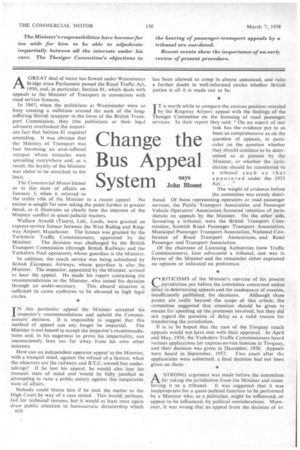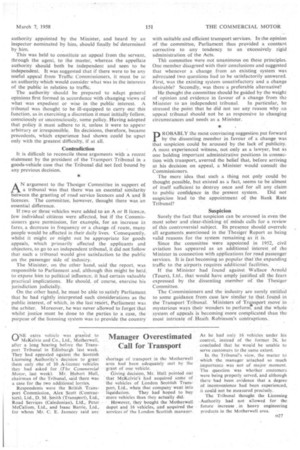e the ppeal Chang Bus A System
Page 68

Page 71

If you've noticed an error in this article please click here to report it so we can fix it.
AGREAT deal of water has flowed under Westminster Bridge since Parliament passed the Road Traffic Act, 1930, and, in particular, Section 81, which deals with appeals to the Minister of Transport in connection with road service licences.
The Commercial Motor hinted as to this state of affairs on January 3, when it referred to
the treble role of the Minister in a recent appeal. No excuse is sought for now taking the point further in greater detail, as it illustrates so clearly how the interests of the Minister conflict in quasi-judicial matters.
Wallace Arnold (Tours), Ltd., Leeds, were granted an express-service licence between the West Riding and Ringway Airport, Manchester. The licence was granted by the Yorkshire Traffic Commissioners, appointed by the Minister. The decision was challenged by the British Transport Commission (through British Railways and the Yorkshire Pool operators), whose guardian is the Minister.
In addition. the coach service was being subsidized by British European Airways, whose guardian is also the .Minister. The inspector, appointed by the Minister, arrived to hear the appeal. He made his report containing his recommendations to the Minister, who issued his decision
through an under-secretary. This absurd situation is sufficient to cause eyebrows to be elevated in high legal circles.
I N this particular appeal the Minister accepted his inspector's recommendations and upheld the Commissioners' decision. It is impossible to suggest that this method of appeal can any longer be impartial. The Minister is not bound to accept the inspector's recommendations and, in his eagerness to prove his impartiality, can unconsciously lean too far away from his own other interests.
How can an independent operator appeal to the Minister, with a tranquil mind, against the refusal of a licence, when the objectors are the railways and B.T.C.-owned bus undertakings? If he lost his appeal, he would also lose his tranquil state of mind and would be fully justified in attempting to raise a public outcry against this inequitable, state of affairs.
Nobody could blame him if he took the matter to the High Court by way of a case stated. This would, perhaps, fail for technical reasons, but it would at least once again draw public attention to bureaucratic dictatorship which D24
T T is worth while to compare the curious position revealed
by the Ringway Airport appeal with the findings of the Thesiger Committee on the licensing of road passenger services. In their report they said: "On no aspect of our task has the evidence put to us been so comprehensive as on the question of appeals, in particular on the question whether they should continue to be determined as at present by the Minister, or whether the jurisdiction should be transferred to a tribunal such as th at appointed under the 1933 Act. . . ."
The weight of evidence before the committee was evenly distributed. Of those representing operators or road passenger services, the Public Transport Association and Passenger Vehicle Operators' Association favoured retention of jurisdiction on appeals by the Minister. On the other side, favouring a tribunal, were the British Transport Commission, Scottish Road Passenger Transport Association, Municipal Passenger Transport Association, National Conference of Road Transport Associations, and Road Passenger and Transport Association.
Of the chairmen of Licensing Authorities (now Traffic Commissioners), four advocated a tribunal, one was in favour of the Minister and the remainder either expressed no opinion or indicated no preference.
e the ppeal
says
John Blount
R1TICISMS of the Minister's exercise of his present jurisdiction put before the committee concerned undue delay in determining appeals and the inadequacy of reasons, insufficiently published, for decisions. Although these points are really beyond the scope of this article, the committee suggested that attention should be given to means for speeding up the processes involved, but they did not regard the question of delay as a valid reason for transferring the jurisdiction.
Ii is to be hoped that the case of the Torquay coach appeals would not have met with their approval. In April and May, 1956, the Yorkshire Traffic Commissioners heard various applications for express-service licences to Torquay, and their decision was given in December, 1956. Appeals were heard in September, 1957. Two years after the applications were submitted, a final decision had not been given on them.
ASTRONG argument was made before the committee for taking the jurisdiction from the Minister and transferring it to a tribunal. It was suggested that it was inappropriate for a quasi-judicial function to be performed by a Minister who, as a politician, might be influenced, or
• appear to be influenced, by political considerations. Moreover, it was wrong that an appeal from the decision of an authority appointed by the Minister, and heard by an inspector nominated by him, should finally be determined by him.
This was held to constitute an appeal from the servant, through the agent, to the master, whereas the appellate authority should both be independent and seen to be independent. It was suggested that if there were to be any useful appeal from Traffi,e Commissioners, it must be to an authority which would consider what was in the interests of the public in relation to traffic.
The authority should be prepared to adapt general opinions first formed in accordance with changing views of what was expedient or wise in the public interest. A tribunal was thought to be ill-equipped to carry out this function, as in exercising a discretion it must initially follow, consciously or unconsciously, some policy. Having adopted that policy it must adhere to it, unless it were to appear arbitrary or irresponsible. Its decisions, therefore, became precedents, which experience had shown could be upset only with the greatest difficulty, if at all.
It is difficult to reconcile these arguments with a recent statement by the president of the Transport Tribunal in a goods-vehicle case that the Tribunal did not feel bound by any previous decision.
AN argument to the Thesiger Committee in support of a tribunal was that there was an essential similarity between the granting of road service licences and A and B licences. The committee, however, thought there was an essential difference.
If two or three vehicles were added to an A or B few individual citizens were affected, but if the Commissioners gave permission, for example, for an increase in fares, a decrease in frequency or a change of route, many people would be affected in their daily lives. 'Consequently, whilst it might or might not be appropriate for goods appeals, which primarily affected the applicants and objectors, to go to an independent tribunal, it did not follow that such a tribunal would give satisfaction to the public on the passenger side of industry.
The Minister, on the other hand, said the report, was responsible to Parliament and, although this might be heid to expose him to political influence, it had certain valuable practical implications. He should, of course, exercise his jurisdiction judicially.
On the other hand, he must be able to satisfy Parliament that he had rightly interpreted such considerations as the public interest, of which, in the last resort, Parliament was the arbiter. Moreover, he was never allowed to forget that whilst justice must be done to the parties to a case, the purpose of the licensing system was to provide the country with suitable and efficient transport services. In the opinion of the committee, Parliament thus provided a constant corrective to any tendency to an excessively rigid administration of the Acts.
Thb committee were not unanimous on these principles. One member disagreed with their conclusions and suggested that whenever a change, from an existing system was advocated two questions had to be satisfactorily answered. First, was the existing system unsatisfactory and a change desirable? Secondly, was there a preferable alternative?
He thought the. committee should be guided by the weight cff opinion and evidence in favour of a change from the Minister to an independent tribunal. In particular, he stressed the point that he did not see any reason why an appeal tribunal should not be as responsive to changing circumstances and needs as a Minister.
pROBABLY the most convincing suggestion put forward by the dissenting member in favour of a change was that suspicion could be aroused by the lack of publicity. A most experienced witness, not only as a lawyer, but as one holding important administrative positions in connection with transport, averred the belief that, before arriving at his decision on appeal, a Minister would consult the Commissioners.
The mere idea that such a thing not only could be thought possible, but existed as a fact, seems to be almost of itself sufficient to destroy once and for all any claim to public confidence in the present system. Did not suspicion lead to the appointment of the Bank Rate Tribunal?
Surely the fact that suspicion can be aroused in even the most sober and clear-thinking of minds calls for a review of this controversial subject. Its presence should overrule all arguments Tinentioned in the Thesiger Report as being valid reasons for the system remaining as it is.
Since the committee were appointed in 1952, civil aviation has appeared as an additional interest ..of the Minister in connection with applications for road passenger services. It is fast becoming so popular that the expanding traffic to the airports requires additional facilities.
If the Minister had . found against Wallace Arnold (Tours), Ltd., that would have amply justified all the fears expressed by the dissenting member of the Thesiger Committee. .
The Commissioners and the industry are surely entitled to some guidance from case law similar :to that. found. in the Transport Tribunal.. Ministers of Transport move 'in mysterious ways their wonders to perform, and the whole system of appeals is b.ecorning more complicated than the most intricate of Heath Robinson's contraptions..
























































































































